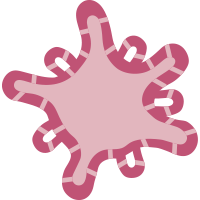
Organoid News
Organoid News is an online resource dedicated to the latest research about and featuring organoids.
Endogenous Mutant Huntingtin Alters the Corticogenesis via Lowering Golgi Recruiting ARF1 in Cortical Organoid
[Molecular Psychiatry] Scientists replicated the altered corticogenesis in the Huntington's disease (HD) fetal brain using HD patient-derived human cortical organoids (hCOs). Our HD-hCOs had pathological phenotypes, including deficient junctional complexes in the neural tubes, delayed postmitotic neuronal maturation, dysregulated fate specification of cortical neuron subtypes, and abnormalities in early HD subcortical projections during corticogenesis.
Claudin-7 Is Essential for the Maintenance of Colonic Stem Cell Homoeostasis via the Modulation of Wnt/Notch Signaling
[Cell Death & Disease] Investigators revealed that Cldn-7 deletion disrupts the self-renewal and differentiation of colonic stem cells alongside the formation of colonic organoids in vitro. Additionally, these Cldn-7 knockout models exhibited heightened susceptibility to experimental colitis, limited epithelial repair and regeneration, and increased differentiation toward the secretory lineage.
FGF7 Enhances the Expression of ACE2 in Human Islet Organoids Aggravating SARS-CoV-2 Infection
[Signal Transduction And Targeted Therapy] Researchers utilized islet organoids derived from human embryonic stem cells, animal models, and COVID-19 patients to discover that fibroblast growth factor 7 (FGF7) enhanced ACE2 expression within the islets, facilitating SARS-CoV-2 infection and resulting in impaired insulin secretion.
Membrane to Cortex Attachment Determines Different Mechanical Phenotypes in LGR5+ and LGR5- Colorectal Cancer Cells
[Nature Communications] Using colorectal cancer patient-derived organoids, investigators found that compared to LGR5- cells, LGR5+ cancer stem cells were stiffer, adhered better to the extracellular matrix, moved slower both as single cells and clusters, displayed higher nuclear YAP, showed a higher survival rate in response to mechanical confinement, and form larger transendothelial gaps.
Claudin-7 Is Essential for the Maintenance of Colonic Stem Cell Homoeostasis via the Modulation of Wnt/Notch Signalling
[Cell Death & Disease] Researchers used intestinal epithelial cells- and intestinal stem cells-specific Cldn-7 knockout mice to investigate the regulatory effects of Cldn-7 on colonic Lgr5+ stem cells in the mediation of colonic epithelial injury and repair under physiological and inflammatory conditions.
Replacing Animal Testing With Stem Cell-Organoids: Advantages and Limitations
[Stem Cell Reviews And Reports] Scientists focused on stem cell related methodologies, such as organoids, that could serve as an alternative to animal testing and discuss its advantages and limitations, alongside regulatory considerations.
Establishment, Characterization, and Biobanking of 36 Pancreatic Cancer Organoids: Prediction of Metastasis in Resectable Pancreatic Cancer
[Cellular Oncology] Researchers demonstrated the molecular architecture of borderline resectable pancreatic ductal adenocarcinoma (PDAC) manifests cancer dissemination of PDAC. 36 organoids isolated from primary tumor masses of PDAC patients with diverse metastatic statues were presented.
A Pancreatic Cancer Organoid-in-Matrix Platform Shows Distinct Sensitivities to T Cell Killing
[Scientific Reports] Investigators described an INTERaction with Organoid-in-MatriX model system, that presentd a 3D co-culture-based platform for investigating matrix-dependent cellular crosstalk. They describe its potential to uncover new molecular mechanisms of T cell responses to murine KPC pancreatic ductal adenocarcinoma (PDAC) cells as well as PDAC patient-derived organoids.
Antisense Oligonucleotide Therapeutic Approach for Timothy Syndrome
[Nature] Scientists developed antisense oligonucleotides (ASOs) to effectively decrease the inclusion of exon 8A in human cells. They discovered that the ASO-mediated switch from exon 8A to 8 robustly rescued defects in patient-derived cortical organoids and migration in forebrain assembloids.
Spatiotemporally Resolved Colorectal Oncogenesis in Mini-Colons Ex Vivo
[Nature] Researchers developed topobiologically complex mini-colons that were able to undergo tumorigenesis ex vivo by integrating microfabrication, optogenetic, and tissue engineering approaches.
Endogenous Mutant Huntingtin Alters the Corticogenesis via Lowering Golgi Recruiting ARF1 in Cortical Organoid
[Molecular Psychiatry] The authors replicated the altered corticogenesis in the Huntington’s disease (HD) fetal brain using HD patient-derived human cortical organoids.
Phototoxicity Avoidance Is a Potential Therapeutic Approach for Retinal Dystrophy Caused by EYS Dysfunction
[JCI Insight] Scientists generated retinal organoids from iPSCs derived from patients with eyes shut homolog (EYS)-associated retinal dystrophy.
Organoids are three-dimensional cell cultures that more accurately model cell behavior, organ function, and pathology than traditional two-dimensional cell culture. Organoid News was launched in 2020 to help scientists stay up-to-date with this revolutionary new research system. Use Organoid News to stay current with the latest applications and discoveries using organoids, as well as new reviews, jobs, news, and upcoming events.

 Cancer Stem Cell News
Cancer Stem Cell News Cell Therapy News
Cell Therapy News Dermal Cell News
Dermal Cell News Endothelial Cell News
Endothelial Cell News ESC & iPSC News
ESC & iPSC News Extracellular Matrix News
Extracellular Matrix News Hematopoiesis News
Hematopoiesis News Hepatic Cell News
Hepatic Cell News Human Immunology News
Human Immunology News Immune Regulation News
Immune Regulation News
 Intestinal Cell News
Intestinal Cell News Mammary Cell News
Mammary Cell News Mesenchymal Cell News
Mesenchymal Cell News Muscle Cell News
Muscle Cell News Neural Cell News
Neural Cell News Organoid News
Organoid News Pancreatic Cell News
Pancreatic Cell News Prostate Cell News
Prostate Cell News Pulmonary Cell News
Pulmonary Cell News
